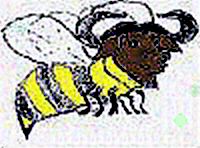
CLUELESS at the Prompt: A new column for new users
by Mike List, troll@net-link.net

Well it's starting to happen.My learning curve is starting to settle down, and if you have been following this column, yours is too, although depending on what you want from Linux, you may have many more questions. At this point you probably are feeling more comfortable using the online resources like the comp.os.linux.??? newsgroups and some of the Linux pages that are hanging out there for you to glean info from.
Some of my regular stops are:If you use a browser the first time you visit the ftp sites you can get a good feel for the directory breakdown, but if you want to download large files ie. distributions, you should use the command line ftp, in my experience, it's faster.
Speaking of the command line ftp program, here are a few tips that can make things go more quickly. You may already be familiar with some or all, but if not, just type ...
Config, dot and .rc files
There are many ways that your linux programs can be altered to your liking, or just to make it work the way it should. Last time I gave an example of how to customize FVWM, but it hardly scratched the surface of all the things that can be done to make your linux environment truly yours.
If you type: ls -a, you'll see several files that start with ".". These are typically configurable files that among other things, create aliases for shell commands, set environment variables, geometry of X applications, and other similar functions.
Some of these "dotfiles"have eluded my attempts to alter them in the ways I'd like, but others have been extremely compliant. Some of the no-gos (for me) include .bashrc and .bash.profile. I'm sure someone will e-mail me and tell me why my aliases don't work, even though I edited the file exactly as shown in the"Bible". Others like the aforementioned .fvwmrc have had extemely gratifying results.Maybe my colleagues at "The Answer Guy" and "The Weekend Mechanic" can shed alittle more light on the subject. In the meantime, backup your dot files before altering them, by cp'ing them to, say .foo.old to keep serious problems at bay, should your editing fail to yield the desired results.
Some of the "dot files" you might want to take a look at for possible tailoring (depending on what you have installed)include your .bash.profile, your .bashrc, or .rc files for any shell you might use, .xinitrc, your window manager's .rc file, browser .rc and .bookmark files.
If you have root privilege. there are many more you have access to but be careful - some files have their own ways of being altered for instance crontabs -e is the way to edit your crontab which has the capability of taking care of routine maintenance at off hours upatedb to create a database for the find and locate commands. Usually run in the wee hours of the morning, this could be configured to run at bootup or every 12 hours or at the end of a workday. This would assure that all of the current day's work would be easily located the next day.
The /etc/ppp/ip-upand ip-down files can cause certain functions when a ppp connection is established. If you don't have one already, you can probably write one that will be noticed by the current software. The same goes for the .bashrc and .bash_profile, with the above caveat in mind.
For the most part, the lines you need to enter or alter will be essentially the same as you would use at the command line, and sometimes it will be as easy as removing the # from the beginning of the line.
Don't use a .bat!
One 'dot file that you can't edit to your liking, but could be useful just the same is .bash_history. If you cat .bash_history | sort>[filename] then less filenameyou will get an idea of what commands are used most often. You can then use this information to create shell scripts or aliases in your .bashrc or .bash.profile or other shell.rc files and save a few keystrokes.
Keep those e-mails coming in, but just so you know, I don't run linux on a new pentium with all the bells and whistles and I don't know much about stuff I haven't used, so I might not be able to help you much with tape drives, CDroms, SCSI peripherals and the like. I'll do my best to point you in the right direction,but I use a 486/66 box with IDE drives and a floppy(3.5"), a vga monitor, a cirruslogic 5428 videocard, internal modem, and an 8bit soundblaster card.I mention this, not to beg for new hardware (although...), but to give you some kind of idea what kind of hardware questions I might be of help with.
See you next month!
Clueless at the Prompt #1 - February 1997
Clueless at the Prompt #2 - March 1997
Clueless at the Prompt #3 - April 1997
Clueless at the Prompt #4 - May 1997
Clueless at the Prompt #5 - June 1997
Clueless at the Prompt #6 - July 1997